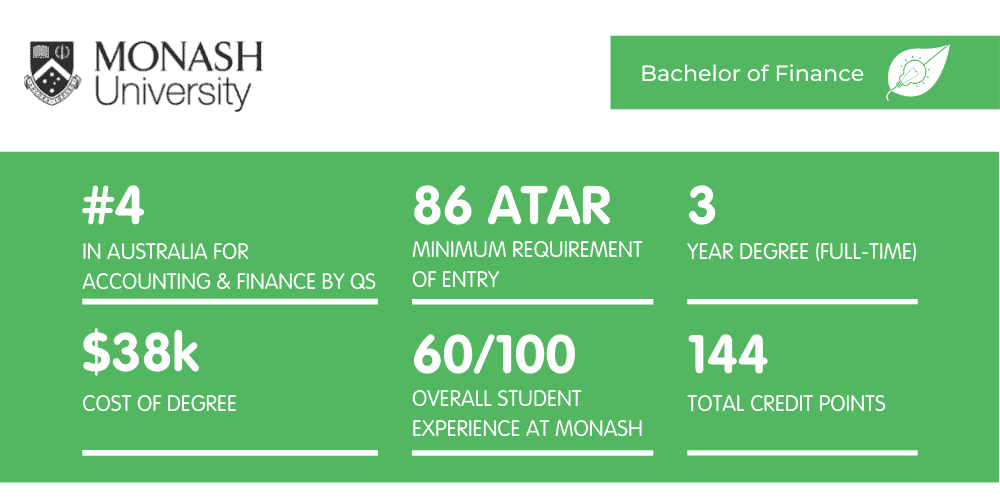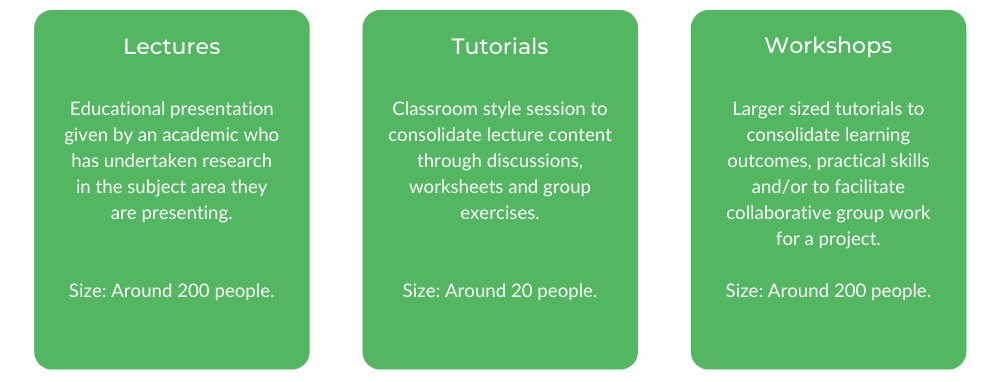Considering studying a Bachelor of Finance at Monash University?
We’ve got the run-down on everything you need to know about the degree, including entry, career paths, units, teaching style and university culture!
Let’s dive in!
What is a Bachelor of Finance at Monash University?
Core Units for this Degree
How to Get into a Bachelor of Finance at Monash
What’s the Teaching Format?
What’s the Faculty and Culture Like?
What is a Bachelor of Finance at Monash University?
A Bachelor of Finance at Monash University focusses on the inner workings of the financial system, teaching students how to invest in and manage money. The degree explores equities and investment, financial modelling, debt markets, fixed income securities, corporate finance and financial modelling.
You’ll learn financial skills you can apply to any industry, so it’s super flexible career-wise! It’s a three year degree, divided into four parts:
-
- Foundation business knowledge
- Specialist discipline knowledge
- Capstone experience
- Free elective study
Can this degree be studied in conjunction with another or completed as Honours?
The degree can be studied as a double degree with Commerce or on its own.
The course can also be used as a pathway to the one year honours program Bachelor of Commerce (Honours), if you’re interested in further studies. To get into honours, you’ll need to maintain a distinction average of 70% or above.
What career paths are available?
In terms of career paths, students have lots of options, as finance can be applied across multiple industries. For the most part, graduates go into financial institutions, such as banks and investment companies.
Specific roles include:
-
- Group finance director
- Stockbroker
- Investment banker
- Commercial banker
- Risk analyst
- Risk manager
- Finance director
- Investment advisor
- Corporate treasurer
- Credit analyst
- Derivatives trader
- Trade finance specialist
Core Units for this Degree
How is the degree structured?
The degree is divided into 4 parts: foundation business knowledge, specialist discipline knowledge, capstone experience and free elective study. Students can take an elective every semester, except for their final semester, when they complete their capstone experience unit.
There are no specific opportunities for practical experience, but it’s highly recommended to complete internships in your own time!
In total, students take 8 electives, meaning they can take many different subjects outside of just the realm of finance. This is a great way to expand your knowledge and build your expertise, while still working towards completing your degree.
Capstone units are designed to bring together everything you’ve learnt throughout your degree. For finance students, the unit is called BFX3999 — ‘Finance and Society’, and serves as a contextualisation for the knowledge you’ve gained at Monash as you apply it to real-life problem solving.
What are the Core Units?
First Year
The first year units are centred around foundational business knowledge in semester 1, before becoming more dedicated to specialist discipline knowledge in semester 2.
Semester 1 focusses greatly on introductory economics and statistics, whilst semester 2 brings in an accounting subject and corporate finance.
The subjects are:
Second Year
Second year finance units see the introduction of derivatives and more in-depth finance units. These include:
Third Year
Semester 1 of your third year of finance is dedicated to a final three units, while the second semester is taken up by three elective study units and the capstone unit.
The semester 1 units include:
How to Get into a Bachelor of Finance at Monash
The ATAR cut-off for guaranteed entry into a Bachelor of Finance at Monash is 86. However, if you don’t receive the specified ATAR, there are other ways to get into the degree!
More information about entry pathways to Monash can be found here.
Are there any prerequisites?
For VCE students, it’s necessary to have completed Units 3 and 4 in both English and Maths, and achieved study scores of at least 27 in English (EAL) or 25 in English other than EAL, and at least 25 in any Mathematical Methods or Specialist Mathematics.
Scholarships
A great scholarship to be aware of is the Achieving Potential Access scholarship, which is designed to help rural or remote students, or students from low income brackets, gain access to university.
If your application is successful, you’ll receive $1500 each year, for the first two years at uni. All eligible students who do not get another scholarship, will receive an offer. It’s a great opportunity!
Monash offers over 360 types of scholarships, which you can find out more about here.
What’s the Teaching Format?
Monash teaches in semesters, with full-time students usually doing four subjects each semester. In terms of Finance, classes usually consist of a recorded lecture and tutorial.
For some units, there is a lecture and a workshop, followed by a tutorial next week.
Class Structure
Lectures
Lectures focus on a different overarching topic each week and are led by an academic. There are usually around 200 students in lectures.
These are recorded, so that means you can have better time management if you ever need to speed them up to listen to them faster!
Tutorials
Tutorials take the content from lectures and put it into practice. They are led by a tutor, who guides the discussion and activities surrounding the lecture topic. There are usually 20 students in each tutorial.
Workshops
Workshops, in this degree, are a space where the lecturer works through lecture exercises with the students and tries to solve problems together. These are usually attended by the whole unit cohort, so around 200 students like lectures.
How many hours do you have to go to university?
Most units require 3-4 hours’ worth of contact hours in classes and lectures, so if you do a full-time load, you’ll be spending 12-16 hours at uni, not to mention doing homework outside of class time!
For finance classes, there is usually some prep-work to do. As it is largely theory-based, there are lots of readings. These can come from textbooks, or academic papers the unit coordinator sets.
Textbooks you will often have to source yourself, but Monash still provides access to databases, as well as their extensive library, to students.
What are the assessments like?
In terms of assessment, most units will have both assignments and exams. Assignments can be theory-based research papers and analyses of theory.
There are also group assignments which require students to apply finance theory to solve problems. These are usually structured into reports and presentations. Exams occur in the middle of the semester and at the end.
“I did find that some unit coordinators overloaded us with work. An assignment would be worth only 10% but we would have so much to do for it…
However, in other units, we often only have a few assignments and exams. It’s usually split between one individual assignment, one group assignment, a mid-semester exam and a final exam. I liked it this way because I did A Levels in high school and this was how it worked for me.” — Aung Khit Paing (Bachelor of Finance at Monash University, 3rd year)
Skills That You Develop
A Bachelor of Finance at Monash can help you develop your analytical skills. As many finance units are quite heavily theory-based, the degree allows you to further your critical thinking skills and apply it to real-life industry concepts like capital investments, foreign exchange, financial forecasting, bonds and stocks.
Studying Finance at Monash will show you how to effectively apply theory to these sorts of situations. The degree is focussed on helping you become a professional at finance, ready to enter the workforce.
The units are very much grounded in what is occurring in the real world, within the industry. With real-life investors teaching some classes, it is a great degree for getting to know the ins and outs of the finance world.
What’s the Faculty and Culture Like?
Faculty
The Monash Business School has a culture that is dedicated to seeing students succeed! There’s an emphasis on industry experience and connection, with much of the faculty being made up of academics who have worked in the industry extensively.
In 2020, there were over 10,000 enrolments in Monash Business School’s undergraduate programs. It is among the top 1% of business schools in the world.
Culture
At Monash, there is the Monash Accounting and Finance Club, which is a place for students of these degrees and majors to come together. They hold welcome nights, networking events, “How to Survive University 101” talks and share jobs relevant to students.
Mentoring
Monash Business School offers some great mentoring programs which allow students to feel supported in their degree progression and make some great contacts!
In first year, there is the Business School Peer Mentoring, which sets up new students with a peer mentor. This is to help make the transition into uni life easier and make some new friends!
The Business School also offers Industry and Alumni mentoring, which connects penultimate and final year students with a mentor relevant to their professional goals. These are both amazing opportunities to get involved in and boost your uni experience.
Elizabeth Noonan is a Content Writer for Art of Smart and an undergraduate student at the University of Sydney. There, she studies a Bachelor of Arts/Advanced Studies, majoring in Media and Communications and French. Elizabeth is a huge movie buff and hopes to go into journalism after she finishes her degree.






